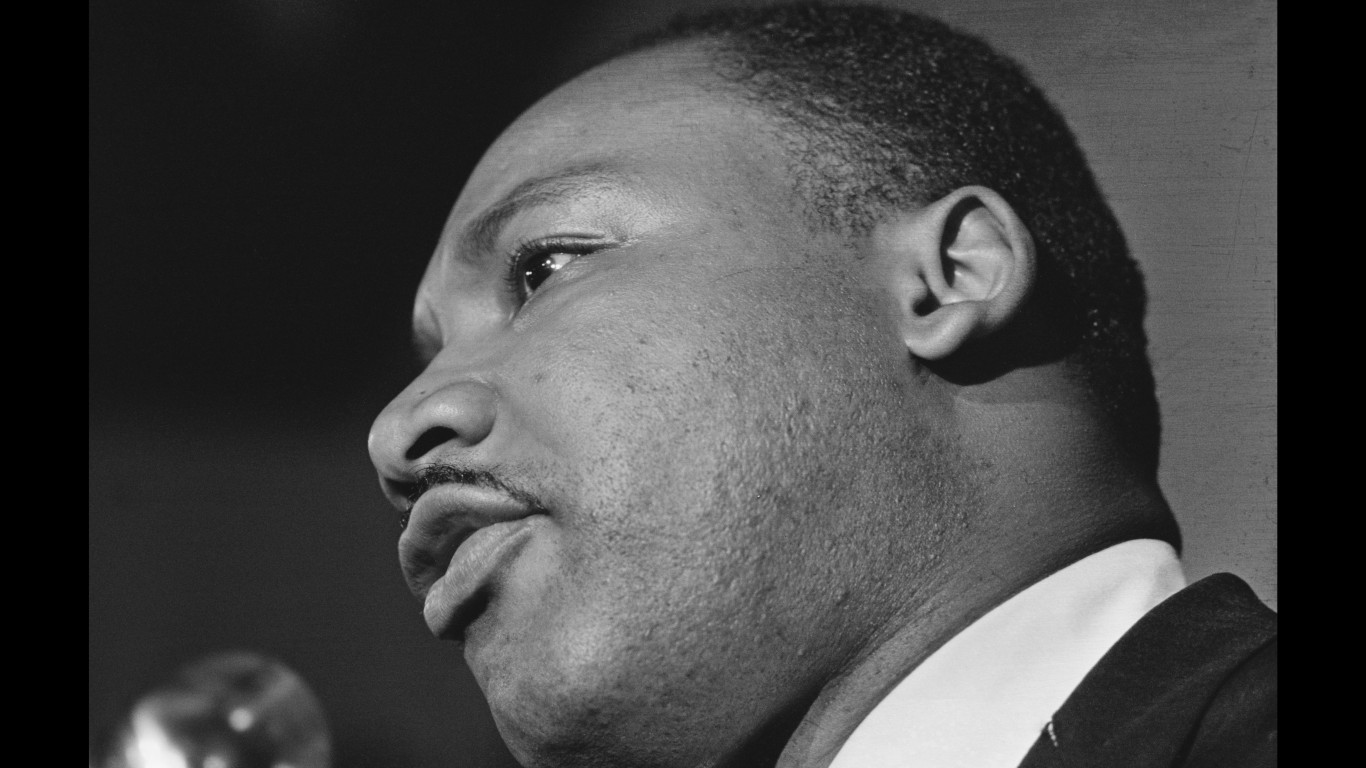
Each year, thousands of young people begin college with the goal of earning a degree and becoming more attractive to employers as they prepare to enter the job market.
Those who hold college degrees tend to work in fields that pay better. In the majority of occupations that require a college degree, workers earn an average annual wage of at least $65,000, compared the median annual wage across all occupations of $37,690. But not all fields are equally lucrative. Many jobs that typically require college degrees for entry-level positions pay less than $50,000.
24/7 Wall St. reviewed the U.S. Bureau of Labor Statistics’ Occupational Employment Statistics Survey to determine the lowest paying jobs for college graduates.
Click here to see the lowest paying jobs for college graduates.
Click here to see our detailed findings and methodology.

33. Fine artists, including painters, sculptors, and illustrators
> Median annual wage: $49,520
> Typical entry-level education: Bachelor’s degree
> Total employment: 28,000
> Projected employment growth (2016-2026): 6.6%
[in-text-ad]

32. Farm and home management advisors
> Median annual wage: $49,510
> Typical entry-level education: Master’s degree
> Total employment: 10,400
> Projected employment growth (2016-2026): 7.5%

31. Exercise physiologists
> Median annual wage: $49,090
> Typical entry-level education: Bachelor’s degree
> Total employment: 15,100
> Projected employment growth (2016-2026): 13.1%

30. Marriage and family therapists
> Median annual wage: $48,790
> Typical entry-level education: Master’s degree
> Total employment: 41,500
> Projected employment growth (2016-2026): 23.4%
[in-text-ad-2]

29. Graphic designers
> Median annual wage: $48,700
> Typical entry-level education: Bachelor’s degree
> Total employment: 266,300
> Projected employment growth (2016-2026): 4.2%

28. Audio-visual and multimedia collections specialists
> Median annual wage: $48,590
> Typical entry-level education: Bachelor’s degree
> Total employment: 11,300
> Projected employment growth (2016-2026): 8.9%
[in-text-ad]

27. Meeting, convention, and event planners
> Median annual wage: $48,290
> Typical entry-level education: Bachelor’s degree
> Total employment: 116,700
> Projected employment growth (2016-2026): 10.9%

26. Recreational therapists
> Median annual wage: $47,680
> Typical entry-level education: Bachelor’s degree
> Total employment: 19,200
> Projected employment growth (2016-2026): 6.5%

25. Statistical assistants
> Median annual wage: $47,400
> Typical entry-level education: Bachelor’s degree
> Total employment: 11,800
> Projected employment growth (2016-2026): 9.2%
[in-text-ad-2]

24. Interpreters and translators
> Median annual wage: $47,190
> Typical entry-level education: Bachelor’s degree
> Total employment: 68,200
> Projected employment growth (2016-2026): 17.7%

23. Clergy
> Median annual wage: $47,100
> Typical entry-level education: Bachelor’s degree
> Total employment: 243,900
> Projected employment growth (2016-2026): 8.2%
[in-text-ad]

22. Education administrators, preschool and childcare center/program
> Median annual wage: $46,890
> Typical entry-level education: Bachelor’s degree
> Total employment: 61,800
> Projected employment growth (2016-2026): 10.8%

21. Athletic trainers
> Median annual wage: $46,630
> Typical entry-level education: Bachelor’s degree
> Total employment: 27,800
> Projected employment growth (2016-2026): 22.8%

20. Social science research assistants
> Median annual wage: $46,000
> Typical entry-level education: Bachelor’s degree
> Total employment: 34,000
> Projected employment growth (2016-2026): 4.3%
[in-text-ad-2]

19. Credit counselors
> Median annual wage: $44,710
> Typical entry-level education: Bachelor’s degree
> Total employment: 38,300
> Projected employment growth (2016-2026): 13.8%

18. Child, family, and school social workers
> Median annual wage: $44,380
> Typical entry-level education: Bachelor’s degree
> Total employment: 317,600
> Projected employment growth (2016-2026): 14.2%
[in-text-ad]

17. Biological technicians
> Median annual wage: $43,800
> Typical entry-level education: Bachelor’s degree
> Total employment: 82,100
> Projected employment growth (2016-2026): 10.2%

16. Agricultural inspectors
> Median annual wage: $43,390
> Typical entry-level education: Bachelor’s degree
> Total employment: 15,600
> Projected employment growth (2016-2026): 4.6%

15. Counselors, all other
> Median annual wage: $43,370
> Typical entry-level education: Master’s degree
> Total employment: 31,800
> Projected employment growth (2016-2026): 14.3%
[in-text-ad-2]

14. Mental health and substance abuse social workers
> Median annual wage: $43,250
> Typical entry-level education: Master’s degree
> Total employment: 123,900
> Projected employment growth (2016-2026): 19.3%

13. Education, training, and library workers, all other
> Median annual wage: $43,140
> Typical entry-level education: Bachelor’s degree
> Total employment: 112,700
> Projected employment growth (2016-2026): 10.8%
[in-text-ad]

12. Community and social service specialists, all other
> Median annual wage: $41,570
> Typical entry-level education: Bachelor’s degree
> Total employment: 100,300
> Projected employment growth (2016-2026): 13.2%

11. Museum technicians and conservators
> Median annual wage: $40,670
> Typical entry-level education: Bachelor’s degree
> Total employment: 11,800
> Projected employment growth (2016-2026): 12.4%

10. Reporters and correspondents
> Median annual wage: $39,370
> Typical entry-level education: Bachelor’s degree
> Total employment: 44,700
> Projected employment growth (2016-2026): -10.0%
[in-text-ad-2]

9. Directors, religious activities and education
> Median annual wage: $38,980
> Typical entry-level education: Bachelor’s degree
> Total employment: 147,100
> Projected employment growth (2016-2026): 7.1%

8. Proofreaders and copy markers
> Median annual wage: $37,550
> Typical entry-level education: Bachelor’s degree
> Total employment: 14,200
> Projected employment growth (2016-2026): 1.7%
[in-text-ad]

7. Rehabilitation counselors
> Median annual wage: $34,860
> Typical entry-level education: Master’s degree
> Total employment: 119,300
> Projected employment growth (2016-2026): 12.7%

6. Graduate teaching assistants
> Median annual wage: $32,460
> Typical entry-level education: Bachelor’s degree
> Total employment: 168,300
> Projected employment growth (2016-2026): 7.7%

5. Radio and television announcers
> Median annual wage: $32,450
> Typical entry-level education: Bachelor’s degree
> Total employment: 41,300
> Projected employment growth (2016-2026): -11.6%
[in-text-ad-2]

4. Coaches and scouts
> Median annual wage: $32,270
> Typical entry-level education: Bachelor’s degree
> Total employment: 276,100
> Projected employment growth (2016-2026): 12.9%

3. Teachers and instructors, all other
> Median annual wage: $30,310
> Typical entry-level education: Bachelor’s degree
> Total employment: 993,900
> Projected employment growth (2016-2026): 9.9%
[in-text-ad]

2. Religious workers, all other
> Median annual wage: $29,310
> Typical entry-level education: Bachelor’s degree
> Total employment: 53,200
> Projected employment growth (2016-2026): 7.7%

1. Legislators
> Median annual wage: $25,630
> Typical entry-level education: Bachelor’s degree
> Total employment: 55,500
> Projected employment growth (2016-2026): 7.1%
Detailed findings & methodology:
Only eight occupations that typically require a college degree have a lower median wage than the national median wage of $37,690. The typical proofreader makes $37,550 that year. Religious workers also make less than the typical American, with a median salary of $29,310. Education workers, including teachers, graduate teaching assistants, and coaches are some of the lowest-paid employees. Most make less than $33,000 per year.
Radio and television announcers make a median salary of $32,450 a year, one of the lowest among careers that are typically filled by college graduates. From 2016 to 2026, the BLS expects 11.6% fewer people will be working as radio and television announcers, the largest drop of any occupation.
Among the jobs paying below the U.S. median, rehabilitation counselor is the only one that typically requires a master’s degree. Despite the high level of education that is usually required, the occupation’s median annual salary is just $34,860.
The lowest paying job for a college graduate is a legislator. While many people view politicians as wealthy, there are thousands of Americans writing laws at the state, county, and city level who are not well compensated compared to other college graduates. The median annual salary for a legislator is just $25,630, thousands of dollars below any other occupation that typically employs college graduates.
To identify the lowest paying jobs that typically require a college degree, 24/7 Wall St. reviewed annual median wage estimates for all occupations from the Occupational Employment Statistics (OES) Survey conducted by the Bureau of Labor Statistics. Wage data is from the 2017 survey. Data concerning the typical education needed for each occupation came from the U.S. Bureau of Labor Statistics’ Employment Projections report.
Thank you for reading! Have some feedback for us?
Contact the 24/7 Wall St. editorial team.
 24/7 Wall St.
24/7 Wall St. 24/7 Wall St.
24/7 Wall St.

